Allison Bruning's Blog, page 20
June 10, 2014
#IndieLife: Pantser or Plotter? #IAmWriting
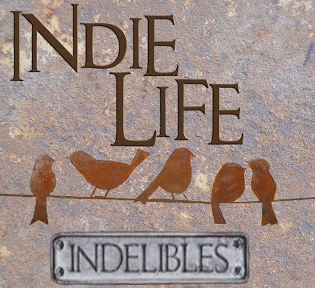
Welcome back to Indie Life.
Are you pantser or a plotter? When I started my writing career in 2008 the first thing another author asked me was this question. I had no idea what they meant. She explained to me that some writers (pantsers) write by the seat of their pants while other writers (plotters) have to plot everything out.
So are you a pantser or a plotter?
Up until 2012 I would have told you that I was a pantser. In fact I wrote this blog post about my writing process during my first book, Calico.
"With so many characters in my head fighting for my attention it can be hard at times to organize my own writing process. I have to admit. I am a pantser. If there were a group called Panster Anonymous I would be their leader. Can you see it now, “Hello, my name is Allison Bruning. I drive writing professors nuts. I am a writer who flies by the seat of her pants then sits down to organize her characters, plots and what ever else needs structure. I am a pantser.” Yeah that’s me. I’m well known to write three copies of the same novel then merge them together into one storyline. I’m also known to start a story, research while writing it then incorporate the research into the storyline. I’ll edit chapter by chapter as I go, inserting information here and there. With Calico, I really didn’t have the interesting details about Hunting Bear until around my third draft. He just wasn’t speaking to me about his motivations until the story was almost completed. I knew he wanted to hurt Calico and I knew it was somehow connected to Alexander but that didn’t come to my story until much later. I had to discover the character of the Demon Bride before Hunting Bear told me why he wanted to hurt Calico. Once the Demon Bride storyline was open up to me, I went back into my story and added the missing chapters and details that were not only vital but missing from my storyline."
Today I just look back at that blog post and laugh. I was such a mess. All I can say is thank heavens for graduate school. I had tried my hand at outlining a story before but it had never seemed to work for me. Let's just face it. I was a lazy writer. I didn't want to take the time to outline when I could have been writing.
Graduate school changed all of that for me. I was introduced to Syd Field's paradigm.
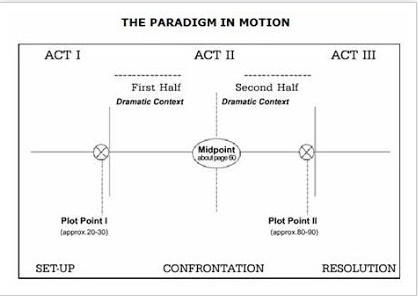
FINALLY! A visual format to use when plotting a writing project. I am a very visual person. I'm a great writer and can write an outline for you but my thoughts easily sway when faced with a long list. But if you present the information to me in a visual format I can retain it longer. I love using the paradigm. One of the blessings that I have found while using it is that I don't face too many of the problems I had when I was writing Calico. The paradigm is the anchor in which my story can hold to form while I am writing. If I feel a character is trying to lead me in a different direction then all I have to do is look back to the paradigm and remember where I was going.
My novels are tighter. My stories are richer. My characters are deeper. All in all I have become a better writer because I am using the paradigm to plot out all of my stories.
So.......Are you a plotter or a pantser?
Published on June 10, 2014 21:00
To Be #Shawnee: Feasting with the Shawnee
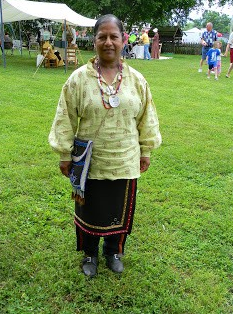 Welcome to my cabin. I cannot tell you my name because anyone who knows my real name has power over me. You may call Christine, for that is how the white people know me. I was born the daughter of the Peace Chief and married a French Fur Trader. You know my people as the Shawnee but we call ourselves the Shawano. Shawano means southerner in our language. Please sit and let me tell you about my people and the feast I have prepared for you.
Welcome to my cabin. I cannot tell you my name because anyone who knows my real name has power over me. You may call Christine, for that is how the white people know me. I was born the daughter of the Peace Chief and married a French Fur Trader. You know my people as the Shawnee but we call ourselves the Shawano. Shawano means southerner in our language. Please sit and let me tell you about my people and the feast I have prepared for you. My people are part of the Eastern Woodland Tribes and shared many culinary traits with the other Woodland tribes.
Our men are highly skilled hunters. They are highly skilled in imitating the calls of a wide variety of animals. One time a man in my village imitate a panther and not soon after the panther pounced on him. The man lived but he never tried to hunt down the panther ever again.
On your plate are a variety of meat that my husband and brothers hunted this morning that represent the kinds of animals we hunt in different seasons. The raccoon is our principal meat during the winter season. Our men watch for when the frogs come out of their hiding places. When that happens we know the raccoons are not that far behind because the raccoons will hunt for them close to the ponds. Our men trap the raccoons by placing a long pole over one of the logs that the raccoons use to hunt. The pole has stakes on the side of it so it won't move. On the end of the pole is a sinew noose. When the raccoon walks across the log it triggers the trap and the pole falls on top of the animal with the noose around it's neck. The other meat on your plate are deer, turkey, rabbit, and fish. Here is my recipe for the baked raccoon on your plate. http://www.nativetech.org/recipes/recipe.php?recipeid=16
On the left side of your plate you will find Hominy. Hominy is one of our favorite dishes and we eat it
 Indian Corn by Thomas Quine
Indian Corn by Thomas Quinehttp://www.flickr.com/photos/quinet/9... a daily basis. Hominy is made from flint corn. You know flint corn by another name, Indian Corn. Flint corn is just one of the varieties of corn that we grow in our community garden.
We, like other Native American groups, plant our crops using the Three Sisters. The Three Sisters are corn, squash and beans. I have made you a wonderful Three Sisters Stew that you can find in the bowl beside your drink. Here is my recipe for that stew from the Oneida Nation. I'm keeping my recipe a secret. http://www.oneidaindiannation.com/culture/threesisters/cookbook/41034407.html
We, Shawnee women, use digging sticks to plant corn kernels. We wait until the corn stalks are about a foot high then return to the garden and plant squash, beans and pumpkins between the stalks. The squash and pumpkin vines will attach themselves to dead trees and stumps. We hoe the corn stalks from time to time with blades made from shells, stone or elk shoulder blades. The bowl above your plate on the right is corn and bean stew. I have placed some pumpkin and squash slices beside your hominy. Beside that is Succotash. You can find my succotash recipe at http://www.nativetech.org/recipes/recipe.php?recipeid=76
On a separate plate, in the middle of the table, are two types of breads that are very common among my people. The one on the left is Sour Bread and the Blue Bread. Here are the recipe for the Sour Bread. I can't share with you the Blue Bread recipe because it's a Shawnee secret.
Sour Bread
1teaspoon baking soda
2 cups white cornmeal
1 teaspoon sugar
2 cups lukewarm water
Mix the ingredients together then let it sit for two or three days. Stir it thoroughly and add cup of flour. Stir again to make the dough. Pour the mixture into a well greased bread pan. Cook at 350 degrees until well browned.
Are you enjoying the meal so far?
Great! Here let me pour you some bread water in your cup. What's bread water? It's a corn drink that we learned how to make from the Creeks.
Time for desert.
Not only do my people hunt and farm but we also gather berries and fruits. We usually eat these uncooked but sometimes we will dry them. I've made you one of my people's favorite dishes. Take a look at the dish I just laid before. These are wild grapes that I have slightly scalded. The thick, rich juice they lie in is from pressing the grapes. I heated the juice up and when it boiled I added dumplings and sugar.
Thank you for visiting my cabin today.
Published on June 10, 2014 04:39
#ExpressYourself: One Word
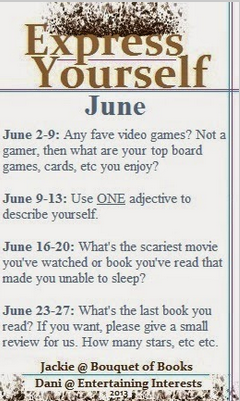
Welcome back to the Express Yourself weekly blog hop. Today I was asked to use one, ONLY one adjective to describe myself. That is so hard because I could think of so many. After thinking about it for awhile I chose......

What do you think?How would you describe me?
Published on June 10, 2014 04:15
#MentalHealthAwareness: #Aspergers and Hypersensitivity
 The world can be a unforgiving and overwhelming place to live, especially if you have Asperger's Syndrome. Last week, I introduced you to the symptoms of Asperger's Syndrome and how they can be exhibited differently between males and females. Although they symptoms of Aspergers can one of the most common symptom between both males and females is hypersensitivity.
The world can be a unforgiving and overwhelming place to live, especially if you have Asperger's Syndrome. Last week, I introduced you to the symptoms of Asperger's Syndrome and how they can be exhibited differently between males and females. Although they symptoms of Aspergers can one of the most common symptom between both males and females is hypersensitivity.Everyone has the following five senses:SightSound TouchTasteSmell
Children and adults with Asperger's Syndrome have the same senses as everyone else in the world but they experience life differently when it comes to uses their senses because one or more of their senses may be over or under sensitive than the others. People with Asperger's Syndrome tend to exhibit their sensitivities in different ways.
For example:
Touch: Does not like touch (especially when unexpected). May be sensitive to textures or different fabricsTaste: Easily gags due to texture or tastes. A "picky" eater.Sounds: Showing great discomfort to loud noises such as fireworks, movies, or parades. Or easily distracted by soundsSmells: Avoids the meat aisle in the grocery store (too stinky). Detects odors that others may not even noticeSight: Bothered by bright lightsThese are just some examples of hypersensitivity that I found on the this site. We've all heard the stories of how a baby with Asperger's Syndrome doesn't want to be touched or held. It's not that the baby doesn't want to receive the parents love. They do. It's just that the baby is sensitive to touch. Yet not everyone who has Asperger's Syndrome exhibits that.
Have you ever known someone with Asperger's Syndrome or Autism? If so, what were they sensitive to?
Published on June 10, 2014 03:54
#SundayPosting: An Early Death

Today's not exactly Sunday but I decided to post this anyways. I haven't been able to post until today due to a death in the family. My husband's cousin died in a work related accident this past week. He was a dear friend to my husband. Johnny and my husband, Delfin, were more than cousins. They were best friends. The hardest part about this weekend was that we weren't able to go to the funeral. We live in Indianapolis, Indiana and my husband is from Marfa, Texas. It's a very expensive trip and my husband is currently in school. So we took this weekend off to mourn his passing.

Published on June 10, 2014 03:06
June 5, 2014
#HeSaidWhat: The ever romantic Earl Isaac James Turner #Ireland

Welcome to another new feature on my blog. The That's What He Said Thursday weekly blog hop features the most romantic lines delivered by the love interest in romance books and is hosted by Chapter Break. Every Thursday, along with the Quote Me Thursday blog hop, I will be presenting images with quotes delivered by the romantic men of all my novels. These quotes will also be featured on my other social media networks as well. You don't want to miss this weekly feature. You just never know what man will appear and what he will say.
Let's travel back in time to October 4, 1738 at Kilmore Castle in Ireland.
The book?Bailey's Revenge (Irish Twist of Fate: 1)
The man?Earl Isaac James Turner
The love interest?Lady Kathleen McGillpatrick

Published on June 05, 2014 02:00
#QuoteMeThursday: How much does he love me?

This week I am pleased to introduce you to a new feature on my blog. I have joined the Quote me Thursday weekly blog hope hosted by the Daily Mayo.
Each Thursday I will present a quote from one of my books, that has to do with writing or has something to do with one of my books. I'll present it on my blog, Instagram, Google+ and other social media networks.
The first posting of the Quote Me Thursday comes from my book Elsa (The Secret Heritage: 1).

Published on June 05, 2014 00:00
June 4, 2014
#SalvationArmy #history: General William Booth restored
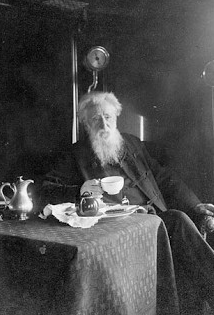 General William Booth:Restoration
General William Booth:RestorationThe last time we visited upon General William Booth we learned he had hard childhood with a father who cared more about money and vanity than his own children. His father's constant struggle to maintain a lifestyle he could not afford came to end when William was thirteen years old. Forced from his education into an apprenticeship as a pawnbroker young William learned many valuable lessons that would lead him on a path to change the world.
William Booth had been born into poverty yet never had never seen what extreme poverty looked like until his apprenticeship. His apprenticeship began with a simple task: Sweep the floors and fold the bedding and clothes that people brought in to pawn. Mr. Eames, the man he apprenticed under, taught him how pawning works. A person needing cash would bring their items to the store. Mr. Eames would value the item and pay the customer only 60% of what the item was worth. Mr. Eames would hold the item for two weeks. If the person didn't return or pay the loan back he would keep the item and sell it at a higher cost than he bought it for. Mr. Eames showed William how to determine the value of something. William noticed people would bring all sort of items, items they would need for work or daily living. Most of the people who came to the pawnshop couldn't afford to buy their items back. It broke William's heart to see how desperate the poor were to pay their rent or put food on the table. He realized this was the kind of work his father would excel at and wanted him to employ. William hated the idea of taking advantage of the destitute just so you better your situation. He was disgusted at the thought of it and hated his apprenticeship.
He stated of that time in his life:
"I had scarcely any income as an apprentice, and was so hard up when my father died, that I could do next to nothing to assist my dear mother and sisters, which was the cause of no little humiliation and grief. The system of apprenticeship in those days generally bound a lad for six or seven years. During this time he received little or no wages, and was required to slave from early morning to late evening upon the supposition that he was 'being taught' the business, which, if he had a good master, was probably true. It was a severe but useful time of learning. My master was a Unitarian--that is, he did not believe Christ was the son of God and the Saviour of the world, but only the best of teachers; yet so little had he learnt of Him that his heaven consisted in making money, strutting about with his gay wife, and regaling himself with worldly amusements."
William's father, Samuel Booth, grew ill and died on September 23, 1842. His father seemed to have a change of heart as he laid dying. He was baptized on his deathbed. After baptism he dedicated his wife, Mary, and their four remaining children to God. The small family sung Rock of Ages as their patriarch died.
A LOVING MOTHER
William didn't know how to feel about his sixty-five year old father's passing. He had always had a closer relationship with his mother than his father. His father had kept a distant relationship with him for most of his life. The only time Samuel gave him attention was when he was trying to push William to make shady deals or use other people to get ahead in the world. William had never felt comfortable using other people for personal gain.
Shortly after her husband's death, Mary moved the family to Goosegate where she set up a tiny sewing shop. She and her three daughters sold sewing needles, thread, hatpins and anything else a woman might require. The small shop wasn't very far from the pawn shop where William apprenticed. Although times were hard for the widow and her children, Mary never abandoned them. She would constantly encourage her children, as she had done throughout their lives, by telling them things would get better. Whenever she could, Mary would walk to the pawn shop where her son worked and check in on him. Mary was the constant rock in William's life and he never forgot her.
William wrote these words about his mother in his book, All the World, published in 1893:
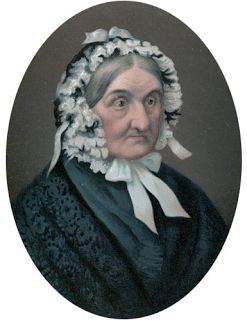 Mary Moss Booth "I had a good mother. So good she has ever appeared to me that I have often said that all I knew of her life seemed a striking contradiction of the doctrine of human depravity. In my youth I fully accepted that doctrine, and I do not deny it now; but my patient, self-sacrificing mother always appeared to be an exception to the rule.
Mary Moss Booth "I had a good mother. So good she has ever appeared to me that I have often said that all I knew of her life seemed a striking contradiction of the doctrine of human depravity. In my youth I fully accepted that doctrine, and I do not deny it now; but my patient, self-sacrificing mother always appeared to be an exception to the rule."I loved my mother. From infancy to manhood I lived in her. Home was not home to me without her. I do not remember any single act of wilful disobedience to her wishes. When my father died I was so passionately attached to my mother that I can recollect that, deeply though I felt his loss, my grief was
all but forbidden by the thought that it was not my mother who had been taken from me. And yet one of the regrets that has followed me to the present hour is that I did not sufficiently value the treasure while I possessed it, and that I did not with sufficient tenderness and assiduity at the time, attempt the impossible task of repaying the immeasurable debt I owed to that mother's love.
She was certainly one of the most unselfish beings it has been my lot to come into contact with. 'Never mind me' was descriptive of her whole life at every time, in every place, and under every circumstance. To make others happy was the end of all her thoughts and aims with regard not only to her children but to her domestics, and indeed to all who came within her influence. To remove misery was her delight. No beggar went empty-handed from her door. The sorrows of any poor wretch were certain of her commiseration, and of a helping hand in their removal, so far as she had ability. The children of misfortune were sure of her pity, and the children of misconduct she pitied almost the more, because, for one reason, they were the cause of sorrow to those who had reason to mourn on their account.
For many years before she died, love, joy, and peace reigned in her heart, beamed from her countenance, and spoke in her words. Her faith was immovably fixed on Him who is able to save to the uttermost. It was a common expression of confidence with her that 'Jesus would go with her all the way through the journey of life--even to the end. He would not leave her. Her feet were on the Rock."
A NEW PURPOSE
Mary and her children faced the worst of their poverty after the death of her husband yet Mary refused to allow the negative situation of their lives destroy them. She kept encouraging their faith through prayer and taking them to Saint Stephen's Church to worship every Sunday. William was quite bored in church and disheartened at the way people were treated in church based on their social economical statues. The poor were forced to sit in seats behind the pulpit or on benches in broad aisles while the rich had reserved the right to sit in the perfect spot to see and hear the message. No one dared to sit in those areas of the church. William, his family and the rest of the poor were cast aside too poor for even Jesus to take notice of them. When the clergy preached their message to the "common people" he rarely looked at the poverty stricken and kept his eyes on the rich. William hated the dull, class discrimination message that the church taught and needed a change.
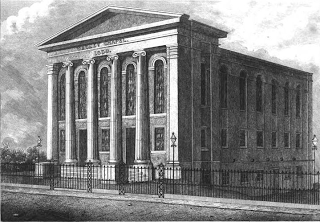 His chance for change came in the fifteenth year of his life when a Wesleyan couple invited him to their church. The Methodist Movement had begun soon after the death of John Wesley. John Wesley had sought to change the Anglican Church yet against his dying wishes his followers started their own church, the Methodist Church. William attended Broad Street Chapel and fell in love with the preachers who visited upon the church to spread their messages. He heard messages from many outstanding preachers and would often reflect upon what he learned on his way back home. Two preachers especially affected young William, Reverend James Caughey form the United States and Isaac Marsden from Yorkshire. William enjoyed the lively singing, the preaching and the free-flow atmosphere during worship. Although he enjoyed his worship experience and learning about God he never settled upon matters of his own soul. The Methodist had taught him he needed to give his entire life over to God but that seemed too hard for William to do. How could he give his entire life?
His chance for change came in the fifteenth year of his life when a Wesleyan couple invited him to their church. The Methodist Movement had begun soon after the death of John Wesley. John Wesley had sought to change the Anglican Church yet against his dying wishes his followers started their own church, the Methodist Church. William attended Broad Street Chapel and fell in love with the preachers who visited upon the church to spread their messages. He heard messages from many outstanding preachers and would often reflect upon what he learned on his way back home. Two preachers especially affected young William, Reverend James Caughey form the United States and Isaac Marsden from Yorkshire. William enjoyed the lively singing, the preaching and the free-flow atmosphere during worship. Although he enjoyed his worship experience and learning about God he never settled upon matters of his own soul. The Methodist had taught him he needed to give his entire life over to God but that seemed too hard for William to do. How could he give his entire life?William struggled with the idea of handing his all to God until one day his bible study teacher, Henry Carey, opened his lesson with these words, "A soul dies every minute." The words haunted William. I think it would be best to hear the rest of the story in William's own words:
"When as a giddy youth of fifteen I was led to attend Wesley Chapel, Nottingham, I cannot recollect that any individual pressed me in the direction of personal surrender to God. I was wrought upon quite independently of human effort by the Holy Ghost, who created within me a great thirst for a new life.
I felt that I wanted, in place of the life of self-indulgence, to which I was yielding myself, a happy, conscious sense that I was pleasing God, living right, and spending all my powers to get others into such a life. I saw that all this ought to be, and I decided that it should be. It is wonderful that I should have reached this decision in view of all the influences then around me. My professedly Christian master never uttered a word to indicate that he believed in anything he could not see, and many of my companions were worldly and sensual, some of them even vicious.
Yet I had that instinctive belief in God which, in common with my fellow-creatures, I had brought into the world with me. I had no disposition to deny my instincts, which told me that if there was a God His laws ought to have my obedience and His interests my service.
I felt that it was better to live right than to live wrong, and as to caring for the interests of others instead of my own, the condition of the suffering people around me, people with whom I had been so long familiar, and whose agony seemed to reach its climax about this time, undoubtedly affected me very deeply.
There were children crying for bread to parents whose own distress was little less terrible to witness.
One feeling specially forced itself upon me, and I can recollect it as distinctly as though it had transpired only yesterday, and that was the sense of the folly of spending my life in doing things for which I knew I must either repent or be punished in the days to come.
In my anxiety to get into the right way, I joined the Methodist Church, and attended the Class Meetings, to sing and pray and speak with the rest." (A Class Meeting was the weekly muster of all members of the church, who were expected to tell their leader something of their soul's condition in answer to his inquiries.) "But all the time the inward Light revealed to me that I must not only renounce everything I knew to be sinful, but make restitution, so far as I had the ability, for any wrong I had done to others before I could find peace with God.
The entrance to the Heavenly Kingdom was closed against me by an evil act of the past which required restitution. In a boyish trading affair I had managed to make a profit out of my companions, whilst giving them to suppose that what I did was all in the way of a generous fellowship. As a testimonial of their gratitude they had given me a silver pencil-case. Merely to return their gift would have been comparatively easy, but to confess the deception I had practised upon them was a humiliation to which for some days I could not bring myself. I remember, as if it were but yesterday, the spot in the corner of a room under the chapel, the hour, the resolution to end the matter, the rising up and rushing forth, the finding of the young fellow I had chiefly wronged, the acknowledgment of my sin, the return of the pencil-case--the instant rolling away from my heart of the guilty burden, the peace that came in its place, and the going forth to serve my God and my generation from that hour.
"It was in the open street that this great change passed over me, and if I could only have possessed the flagstone on which I stood at that happy moment, the sight of it occasionally might have been as useful to me as the stones carried up long ago from the bed of the Jordan were to the Israelites who had passed over them dry-shod. Since that night, for it was near upon eleven o'clock when the happy change was realised, the business of my life has been not only to make a holy character but to live a life of loving activity in the service of God and man. I have ever felt that true religion consists not only in being holy myself, but in assisting my Crucified Lord in His work of saving men and women, making them into His Soldiers, keeping them faithful to death, and so getting them into Heaven."
William vowed, "God should have all there is of William Booth." William's life was about to change forever.
Published on June 04, 2014 21:00
#MentalHealthAwareness: Understanding Girls With #Aspergers?
 Welcome back to my series on Aspergers and Autism for the Mental Health Awareness Month Blog Hop. The last time I posted I introduced you to the term Asperger's Syndrome and how it affects those who have it. The guidelines given to medical and mental health professions in the DSM is supposed to help them diagnosis Aspergers but there are many who have Asperger's Syndrome that fall through the cracks. The majority of these patients are women.
Welcome back to my series on Aspergers and Autism for the Mental Health Awareness Month Blog Hop. The last time I posted I introduced you to the term Asperger's Syndrome and how it affects those who have it. The guidelines given to medical and mental health professions in the DSM is supposed to help them diagnosis Aspergers but there are many who have Asperger's Syndrome that fall through the cracks. The majority of these patients are women.The problem with using the DSM to diagnosing women and girls with Asperger's Syndrome is that the criteria was developed by the studies that Hans Asperger conducted on boys. Women who have Asperger's Syndrome often times do not exhibit the same symptoms as their male counterparts. It is estimated the male to female ratio is between 2:1 and 16:1. These ratios may be greatly distorted because many women and girls are left undiagnosed. It can be very frustrating for women who have Asperger's Syndrome but are left undiagnosed.
So just how do women and girls with Asperger's Syndrome differ from their male counterparts and what qualities do they share?
Here's are some great charts that was created by help4aspergers.com that can answer that question.


Mental Health professionals are still trying to understand how Asperger's Syndrome exhibits itself in females. We've come a long way since Hans Asperger made his clinical diagnosis of Asperger's Syndrome in the 1940's. In 2011, the National Autistic Society in the United Kingdom found the following differences in woman with Asperger's Syndrome.
Girls are more able to follow social actions by delayed imitation because they observe other children and copy them, perhaps masking the symptoms of Asperger syndrome (Attwood, 2007).Girls are often more aware of and feel a need to interact socially. They are involved in social play, but are often led by their peers rather than initiating social contact. Girls are more socially inclined and many have one special friend.In our society, girls are expected to be social in their communication. Girls on the spectrum do not ‘do social chit chat’ or make ‘meaningless’ comments in order to facilitate social communication. The idea of a social hierarchy and how one communicates with people of different status can be problematic and get girls into trouble with teachers.Evidence suggests that girls have better imagination and more pretend play (Knickmeyer et al, 2008). Many have a very rich and elaborate fantasy world with imaginary friends. Girls escape into fiction, and some live in another world with, for example, fairies and witches.The interests of girls in the spectrum are very often similar to those of other girls – animals, horses, classical literature – and therefore are not seen as unusual. It is not the special interests that differentiate them from their peers but it is the quality and intensity of these interests. Many obsessively watch soap operas and have an intense interest in celebrities.There is still so much more we need to learn about Asperger's Syndrome.
Published on June 04, 2014 02:00
June 3, 2014
#ISWG: The Literary Bumper Month #CampNaNoWriMo

Can you believe it's June already? This is a very important month for the literary world. This month is the bumper month between the two Camp NaNoWriMo sessions. If you participated in Camp NaNoWriMo last month and meet your goal then congratulations. Don't feel bad if you didn't meet your goal. I didn't this year, either. But I plan to hit the ground running in the second Camp NaNoWriMo session starting July 1st.
Now that you have finished your novel you probably want to turn it into a publisher or self-published. But you don't want to do that, just yet. The end result of your Camp NaNoWriMo experience should have given you a first draft. I stress the 1st draft part because a lot of new authors assume that once they have completed their novel it is ready to submit to publisher.
That is not true.
You looked stunned and confused. Stay with me now.
 The first draft you hold in your hand is not large enough to be considered a complete novel. It will grow as you go through the editing process. That's ok. An average novel is anywhere between 80,000 to 100,000 words. Anything above 100,000 words is considered an epic. Most publishers will not consider an epic from any new authors. They want to ensure the authors have enough followers to produce sales.
The first draft you hold in your hand is not large enough to be considered a complete novel. It will grow as you go through the editing process. That's ok. An average novel is anywhere between 80,000 to 100,000 words. Anything above 100,000 words is considered an epic. Most publishers will not consider an epic from any new authors. They want to ensure the authors have enough followers to produce sales.The first thing you want to do is read through your manuscript very carefully. You're looking for plot holes, grammatical errors and structural issues. CampNaNoWriMo does not allow you the opportunity to edit as you go through the writing process. And that is ok. The main goal of Camp NaNoWriMo is to get the story out. You can edit later.
Another piece of advice while you are editing your work. Don't worry if your story changes along the way. As long as the story stays true to the outline or paradigm you created before you wrote a single word then it will be alright. If you have more than one character with the same motive, mannerisms or purpose in your book consider combining the two characters into one character. You want to make sure it is very evident who your protagonist and antagonists are. There should be only one of each in your story.
After you have edited your piece you will need to send it out to a few beta readers. Beta readers are
people who love to read books in your genre. They will tell you what works and what doesn't. They are not editors and please do not treat them as such. These are readers who will tell you if they think your book will sell in your genre and why not. You do not want to pick just anyone to beta read your book. You want to make sure the people you chose to beta your book are people who are very familiar with the genre and are willing to be brutally honest with you.
Once you receive the notes from your beta reader you will want to go over their notes and implement any changes they have suggested that will better your story.

Well a month or two have gone by since Camp NaNoWriMo occurred and you are done with the beta readers. You now have your completed second draft but your still not ready for publishing. What's next? An editor. You need fresh eyes on your masterpiece. Find a friend who is great at editing or hire a professional editor to go through your manuscript. WARNING - professional editors will charge between $1-$5 per page to edit your manuscript.
After you receive your edits back from the editor you will want make the changes they have suggested for your manuscript. Afterwards, go back through your manuscript and tighten it up. By the time you have finished this process your novel should now be between 80,000 - 100,000 words and you are ready to submit your novel to the publisher.
Published on June 03, 2014 21:00



